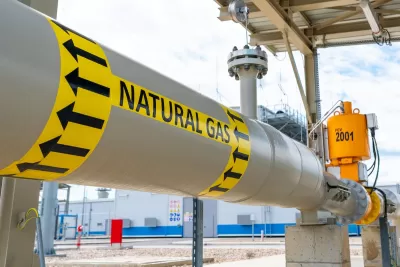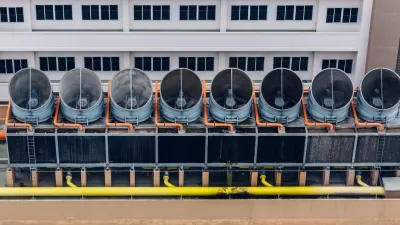The center would be powered by a new, 1,500-megawatt natural gas plant, which critics say will drive up emissions and contribute negatively to the region’s air quality.

A massive data center planned for northeast Louisiana is drawing concern from residents and critics who say the project will create carbon emissions from a proposed 1,500-megawatt natural gas plant owned by Entergy that would be built to power the center. “Data centers are forecast to account for up to 12% of all U.S. electricity demand by 2030, according to consulting firm McKinsey and Co., citing “skyrocketing compute and data demands.” Today that amount is 3% to 4%, McKinsey said.”
As Pam Radtke explains in an article for Floodlight, “The data center, the power plant, or possibly both, will be built on a 1,400-acre site, called Franklin Farms, owned by the state, according to filings with the Louisiana Public Service Commission.”
The company that would own the data center is yet to be named, Radtke adds. “Details about the data center are cloaked in secrecy and non-disclosure agreements. But Entergy Louisiana has filed hundreds of pages of redacted documents with state regulators about its dealings with the unnamed company. In its filings, Entergy says the data center will employ 300 to 500 people with an average salary of $82,000.”
To offset its emissions, the unnamed company is “expected to make a substantial contribution” toward an Entergy carbon capture and storage project. But there are concerns beyond the environmental aspects. According to Radtke, “Costs not paid by the data center, either through electricity rates or separate agreements, would be spread across Entergy’s 1.1 million Louisiana customers, although the utility says the proposed deal ‘largely insulates (Entergy’s) other customers from paying for the upgrades required’ for the data center.”
FULL STORY: Huge gas plant eyed to power mystery $5B Louisiana data center

Planetizen Federal Action Tracker
A weekly monitor of how Trump’s orders and actions are impacting planners and planning in America.

Congressman Proposes Bill to Rename DC Metro “Trump Train”
The Make Autorail Great Again Act would withhold federal funding to the system until the Washington Metropolitan Area Transit Authority (WMATA), rebrands as the Washington Metropolitan Authority for Greater Access (WMAGA).

The Simple Legislative Tool Transforming Vacant Downtowns
In California, Michigan and Georgia, an easy win is bringing dollars — and delight — back to city centers.

Albuquerque’s Microtransit: A Planner’s Answer to Food Access Gaps
New microtransit vans in Albuquerque aim to close food access gaps by linking low-income areas to grocery stores, cutting travel times by 30 percent and offering planners a scalable model for equity-focused transit.

This City Will Pay You to Meet Your Neighbors
A North Kansas City grant program offers up to $400 for residents to throw neighborhood block parties.

Commentary: Our Silence Will Not Protect Us
Keeping our heads down and our language inoffensive is not the right response to the times we’re in. Solidarity and courage is.
Urban Design for Planners 1: Software Tools
This six-course series explores essential urban design concepts using open source software and equips planners with the tools they need to participate fully in the urban design process.
Planning for Universal Design
Learn the tools for implementing Universal Design in planning regulations.
Smith Gee Studio
City of Charlotte
City of Camden Redevelopment Agency
City of Astoria
Transportation Research & Education Center (TREC) at Portland State University
US High Speed Rail Association
City of Camden Redevelopment Agency
Municipality of Princeton (NJ)





























